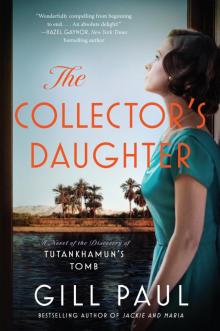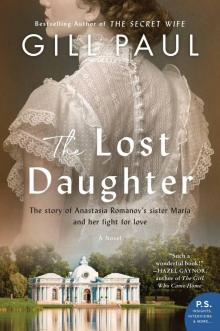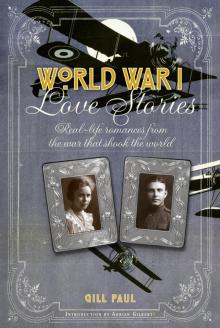The Secret Wife Read online
Page 25
‘I don’t trust them,’ Dmitri said. ‘I love my homeland as much as any Russian but I will not return until the Bolsheviks have been overthrown. The farcical trials and the inhuman prison camps demonstrate the true nature of their rule and I think it is wrong for writers implicitly to condone these.’
His friend agreed. ‘Did you hear about the prison on the Solovki Islands? A favourite punishment there is mosquito torture whereby they tie a man naked to a stake in the midst of a swarm. It is barbarian.’
They were interrupted by a commotion on the dance floor and when Dmitri stood to look, he saw Rosa lying on the ground. He rushed over.
‘What happened?’ he asked, kneeling beside her. Her eyes were closed but he could hear her murmuring.
‘She collapsed with no warning,’ someone said.
The manager approached with two of the doormen. ‘Let’s take her to a backroom where she can recover,’ he suggested. One of them lifted Rosa and carried her through a curtain to a room with a stained red velvet sofa and little else. She opened her eyes as she was laid on the sofa.
‘Dmitri? Where am I?’
‘In the club. You fainted,’ he told her, squeezing her hand. ‘How are you feeling?’
‘I’m all right. Just a little dizzy.’
‘Please call a doctor,’ Dmitri instructed the manager. ‘I can pay.’
While they waited for the doctor to arrive, Rosa rested with her eyes closed and Dmitri looked around the room. He guessed this was where the female staff brought favoured customers for ‘special treatment’, in return for generous tips. There was a nicotine-stained mirror on one wall, and a reproduction painting of naked shepherdesses on another.
When the doctor arrived, he took Rosa’s pulse, listened to her heart through his stethoscope, then asked her a string of questions in rapid German, which Dmitri could not follow. He prodded gently around her stomach and nodded to himself.
‘What do you think it is?’ Dmitri asked.
The doctor finished his examination before he replied. ‘Your wife is pregnant, sir. Congratulations.’
Rosa gasped and covered her mouth with her hand. Dmitri looked at her. ‘Are you sure?’
‘Yes, I can feel the top of the uterus. In my opinion the pregnancy is more than twelve weeks along.’
Rosa still had a hand over her mouth but Dmitri could see from her eyes that she was delighted, and he smiled reassurance at her, although he felt shell-shocked. His first reaction was panic: he couldn’t have a child with Rosa; he would be tied to her then. Tatiana would be devastated if she found him and discovered he had a child with another woman. She might divorce him. But what could he do? He had no choice in the matter.
Dmitri followed the doctor outside to pay him. As he counted the notes, the doctor said: ‘Your wife should rest and eat well. No more nightclubs.’
‘She’s not my wife. I’m already married so it is rather a delicate situation …’
The doctor gave him a sharp, unfriendly look. ‘You’ve got yourself into rather a mess, sir. I hope you will behave with decency.’
Shamefaced, Dmitri called a taxi to take Rosa home.
‘Isn’t it strange?’ she exclaimed as they sat in the back seat, Dmitri’s arm around her. ‘I had no idea. I thought I had put on a little weight, that’s all. Do you think it might be a girl or a boy?’
Dmitri shrugged. ‘No idea.’
‘I would prefer a boy so he could grow up just like you.’ She seemed nervous. She always talked too much when she was nervous. ‘If the doctor is right about it being twelve weeks, then he will arrive in May next year. That would be lovely – just in time for the summer. You don’t mind about this, do you, darling?’
‘It’s still a bit of a shock,’ he admitted.
‘Yes, for me too. I didn’t think we had taken any risks.’ Dmitri usually withdrew when Rosa was in the fertile part of her monthly cycle. ‘And I hadn’t noticed that I had missed my monthlies. But now it has happened … it will take some getting used to but do you think you will be happy?’
‘Give me a little time to get used to the idea,’ Dmitri said, but he gave her shoulders a reassuring squeeze.
‘We’ll need a bigger apartment,’ she continued. ‘Not straight away but our son will need a bedroom of his own …’
Dmitri laughed. ‘You are convinced he is a boy, even though you knew nothing of his existence until a couple of hours ago!’
‘Yes,’ she agreed. ‘It’s strange, but I am.’
Back in the apartment he helped her into bed then climbed in beside her and switched off the light.
In the darkness, Rosa asked timidly: ‘Dmitri, could we please get married before the baby comes? It would mean so much … And my family will ask …’
‘I can’t,’ he told her gently. ‘I’m already married.’
‘Yes, to a ghost,’ she said sadly. ‘How can I ever compete with that?’
Chapter Forty-Five
Berlin, 1925
The baby was a healthy boy, with sandy blonde hair, blue eyes and Russian bone structure. He looked remarkably similar to Dmitri’s father.
‘What would you like to call him?’ Rosa asked, unable to take her eyes off him as he sucked greedily at her breast. She was blooming, her cheeks pink and her short hair lustrous. Dmitri had been worried that neither of them would know what to do with a baby, but straight away Rosa seemed to have an instinct for motherhood. She was so calm that the child stopped crying the instant he was snuggled in her arms.
‘I like the name Nicholas,’ he said. ‘How about you?’
‘Nicholas is lovely!’ she cried. ‘Do you mean after your tsar?’
‘No, our tsar was a fool. I just like the way the syllables fall from the tongue. Nich-o-las.’
Rosa had found a crib for the boy and arranged his things in the corner of their bedroom. She sang as she rocked him to sleep, or changed his nappy, or played with him on the rug; it was obvious she was happy. She had given up asking Dmitri to marry her but only insisted that he buy her a ring so that people thought them married, and to that he consented.
After the birth, he had planned to take his typewriter to a café on the corner to work without interruption, but found that he liked being at home, with the babble of their voices in the next room and the smell of his lunch bubbling on the stove. Rosa was careful not to disturb him while he was working: as well as continuing to write articles for Rul he had started a new novel.
Like his first novel, Exile had elements of autobiography: the main character was haunted by a terrible act he had committed in his past, before being banished from his homeland, and living a shadowy half-life, unable to forget. Dmitri analysed the experience of being a stranger in a foreign land, with a culture quite different from his own, and concluded that in many ways it was liberating. In Berlin he could reinvent himself outside the strict rules of Russian society. Had his father been alive, he would never have been able to become a writer; he would have been expected to pursue a military career all the way to the top, amassing medals as he went. And yet, he still felt a sense of dislocation, as though he was leading someone else’s life. Not being fluent in German annoyed him; somehow he couldn’t get to grips with the staccato rhythms of the language. And his relationship with Rosa still felt temporary; she was someone to keep him company until Tatiana returned. Even with the baby he couldn’t shake that feeling, although he knew it was unfair to Rosa.
He had no complaints about her. In many ways she was the perfect wife: cheerful, affectionate and forgiving. She asked little of him: a roof over their heads, money for food, and not much else. When her mother and sister visited, he was polite and welcoming, although their disapproval of him was visceral.
‘Why do you love me?’ he asked Rosa once. He genuinely couldn’t understand it.
‘Because you need me,’ she replied. ‘Because I want to try and make you happy.’
‘It won’t work,’ he told her. ‘Melancholy is the condition of the Rus
sian soul.’
And yet, Rosa could make him laugh, almost against his will. When she returned from the daily shopping trip, she usually had a vignette of some tiny incident with which to entertain him: a housewife scrubbing her front steps with vigour then a bird defecating on them with a huge splat just as she turned to go indoors; a bad-tempered tram conductor who was unaware someone had stuck a notice on his back saying ‘I’ve not had a bath since 1917’.
They no longer went out in the evenings, because they could not afford a Kinderhüter never mind the cost of alcohol in the cafés and nightclubs, but Dmitri would pour himself a vodka at home. Sometimes they invited friends for supper, but mostly they read books or listened to the radio. He was not unhappy. At night, they often made love. Rosa had a remarkable enthusiasm for sex and a talent for arousing him even when he felt exhausted. Cool fingers, the touch of her lips, her luscious breasts pressed against him, all had a miraculous effect on his libido. She had assured him that it would be impossible for her to get pregnant again while she was breastfeeding little Nicholas, so they were both astonished to find, when the baby was just seven months old, that she was wrong about that. Their doctor confirmed another was due the following year.
‘Wouldn’t it be lovely if we had a bigger apartment, where the children could have their own room,’ Rosa sighed. She didn’t nag – never nagged – but he knew it was a reasonable request. He asked his publisher for an advance against the next novel and managed to pay the deposit on a two-bedroom apartment not far away, where they moved just before a little girl was born in the summer of 1926.
‘Can I call her Marta?’ Rosa pleaded. ‘I always wanted a daughter called Marta.’
‘Of course,’ Dmitri replied, his voice a little husky. ‘Marta is a pretty name.’
The strength of his feelings when he looked at his baby daughter amazed him: a combination of protectiveness and sheer awe at her innate femininity. Even as a newborn she held her hands daintily, like a ballerina, and gazed up at him with innocent adoration. How could they have created someone quite so beautiful? Sometimes he almost fancied she looked like Tatiana – although that was, of course, impossible.
‘Hello, little girl,’ he whispered, and she clutched his finger in a surprisingly strong fist. Nicholas had begun to crawl and annoyed him by grabbing at his papers, knocking over cups, falling down and wailing even though he could not possibly be hurt. Secretly Dmitri admitted to himself that he loved his daughter more. Nicholas was clumsy and needful of attention, reminding Dmitri of himself as a child, while Marta seemed graceful and sure of herself, completely unlike him. When he said anything of the sort to Rosa, she laughed and chided him: ‘They’re babies! You can’t possibly judge their characters yet.’
In summer 1927, Exile was published, and it proved rather more controversial than Interminable Love, with much debate over Dmitri’s views of life in exile. The discussion was taken up by the German press when it was published in translation, resulting in many more sales. The book was reprinted and for once they had a little money to spare. Dmitri gave Rosa cash to buy new clothes for herself and the children, and one summer’s day they took a day trip to the countryside with a picnic that Rosa had carefully packed in a wicker basket.
Watching the children playing on the grass, completely caught up in the moment, and watching Rosa hum as she cut big hunks of bread and cheese to serve with beer and sausage, Dmitri felt the closest he ever came to happiness. He examined the sensation, suspicious of it, feeling he did not deserve it. What about Tatiana? What about the way he had let her down?
Rosa handed him his food, then leapt to her feet, tucked one child under each arm and began to spin them round and round. Nicholas and Marta shrieked and chortled from deep in their bellies and suddenly Dmitri found himself laughing too. It was still an unfamiliar sensation for him but it got easier every time.
On the way back on the train, as the children slept on their laps, Rosa asked him a question that had obviously been on her mind: ‘Would you go back to Russia if the Communists were overthrown?’
He frowned. ‘It’s not going to happen in my lifetime. They are too firmly entrenched.’ He realised from her disappointed expression this wasn’t the answer she wanted.
‘But if they were to fall? What would happen to me and your children?’
‘Rosa, I will always look after you. I promise. You have nothing to fear.’
She was playing with the ring on her wedding finger, about to say more, but instead she turned with an almost imperceptible sigh to look out of the window. Suddenly Dmitri saw the situation from her point of view and realised he was treating her appallingly. She loved him, she had borne him two children, and still he was not committing himself to her. It wasn’t fair.
‘Wherever I go, you three will come with me. You are my family,’ he said, and meant it.
Rosa grinned and leaned over to kiss him, carefully, without waking the babes. Deep down Dmitri felt uneasy. What if Tatiana came back? But then a voice said, ‘What if she doesn’t?’ He had made a life, albeit by default rather than choice, and now he must stick with it.
Chapter Forty-Six
Lake Akanabee, New York State, 1st October 2016
The 30th of September was warm and sunny but a cold front swept in overnight and Kitty woke to a chilly, overcast morning on the 1st of October, almost as if the weather was following the calendar. She thought she had been pretty thorough with her repairs, but draughts mysteriously found their way in, making it hard to warm up when she came out of the cold shower. How had Dmitri survived here in winter? He must have been very hardy.
Did Rosa stay with him? Did the children visit? She had found out a few things about his life in Berlin but virtually nothing about what they did in America, apart from the date of their arrival: June 1934.
Kitty had to go to Indian Lake for food and on the way she stopped at the vacation park coffeehouse.
‘Only two weeks until we close for winter,’ Jeff told her. ‘You’re my first customer today and I don’t expect there will be many more.’
‘I’m only here till the fourteenth,’ Kitty told him. ‘But I’ll be back next year. When do you open again?’
‘Easter. It can still be snowing, but we get some hardy souls who venture out.’
Kitty plugged in her laptop and sipped her coffee. She had hit a brick wall researching Dmitri so she decided to see what she could find about Rosa Liebermann through her genealogy site. Straight away she found that she had lived in the Albany area after her arrival in the US, that she served on the Parent-Teacher Association at the high school and volunteered at the hospital. Her mother and sister had come over from Germany in 1936 and lived nearby. She supposed that Dmitri and Rosa must have discovered Lake Akanabee while living in Albany. Were they outdoorsy types?
She remembered Bob saying that he had never seen anyone with Dmitri: no woman, no children. And there was the mystery about why no one had been able to contact the children when he died. Had they divorced and the children took their mother’s side? Kitty searched but could find no record of a divorce.
It was easier to find information about her great-uncle Nicholas, who had moved to California at the age of thirty and got work at a winery in Sonoma Valley. He’d married a Californian girl but they didn’t have any children and she was shocked to read that he died in 1970, before Kitty was born. He’d only been forty-five years old. Kitty vaguely remembered Grandma Marta saying how close they had been as children and how much she missed him when he was gone. They used to have little chats when Marta came to stay over to let Kitty’s mum and dad go out for the evening. Kitty would crawl into her grandmother’s bed in the morning, smelling the familiar old-lady smell of talcum powder and gawping at her teeth in the glass by the bed.
Marta had moved to Britain in the late 50s and Kitty assumed she had come for love, because she married a Sheffield businessman. Kitty’s mum, Elizabeth, had been born in 1960, an only child, and had Kitty in 1981. So the fa
mily was geographically spread out, but she couldn’t understand why the police had been unable to find any of them when Dmitri died in 1986. Didn’t he have an address book, for goodness’ sake?
Kitty asked Jeff for another coffee and opened her email folder. The usual rush of messages popped up one after another. Tom, Tom, friends, spam, Tom, Amber, Tom … Random House New York. Kitty clicked to open the Random House message.
Dear Ms Fisher,
I am afraid there are no editors remaining here who knew your great-grandfather Dmitri Yakovlevich but I can see from the historical accounts that he was a much-valued, very successful Knopf author from the 1930s through to the 1970s. My intern found some of his old manuscripts in our archives and, if you would like to have them, we’d be happy to send them on.
I haven’t read any of his works yet but plan to have a look at In the Pale Light of Dawn and Toward the Sunset as soon as I can find the time. I warn you that there is not much demand for reprints of 1940s novels unless there are special circumstances but I will approach them with an open mind.
Many thanks for getting in touch.
All best wishes, Rebecca Wicks
It was nice to feel that Dmitri’s work was appreciated, even though his contemporaries had moved on. She would like to see those manuscripts but couldn’t decide where to have them sent. She could give the address in London’s Crouch End but what if she never lived there again? A tight band of panic encircled her chest as she thought about renting a flat, getting a job and starting her adult life from scratch. That wasn’t what she wanted.
Suddenly she began to type an email to Tom, the words flowing, fingers dashing across the keyboard:
Dear Tom,
I have read and considered your letter but have to tell you that the last thing in the world I want to do is to sit in a dingy consulting room with some smarmy counsellor telling us what’s wrong with our relationship! You knew when you married me that I tend to avoid emotional confrontation; it’s part of who I am and I am not about to change.

 The Collector's Daughter
The Collector's Daughter The Lost Daughter
The Lost Daughter Jackie and Maria
Jackie and Maria The Affair
The Affair Love...Maybe
Love...Maybe The Secret Wife
The Secret Wife No Place For a Lady
No Place For a Lady Another Woman’s Husband
Another Woman’s Husband World War I Love Stories
World War I Love Stories World War II Love Stories
World War II Love Stories